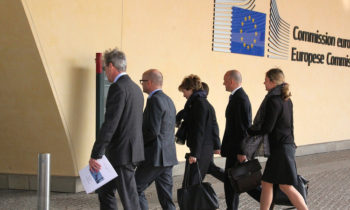 Norway is far from enthusiastic about the prospect of the UK remaining a member of the EEA via EFTA.
Norway is far from enthusiastic about the prospect of the UK remaining a member of the EEA via EFTA.
The reason for this is that only Norway, Iceland, and Liechtenstein have membership in the EEA thanks to the EFTA agreement.
By comparison, the UK is a giant and would most likely run the show, thus reducing Norway’s influence.
Membership of the EEA makes Norway and the other two countries that access the single market via EFTA “three-quarter” members of the EU.
When the Norwegian people said “no” to full membership for the second time, in a referendum in 1994, the EEA agreement was an argument that Eurosceptics used to justify voting “no”.
EEA membership would allow Norwegian businesses access to the European single market without the country having to join the Euro or agree to a closer union.
Neither the Norwegian Parliament nor the government were aware of just how extensive the EEA agreement would become when it came into force in January 1994.
What did Norway sign up to?
Norway agreed to accept all EU legislation regarding the single market, and to accept all future legislation that the EU might adopt for the single market, regardless of what this might be.
Parliament approved this while revoking any Norwegian legislation, regulations, and administrative decisions that might be in breach of the basic principles of the EU Treaty or any EU legislation on the single market.
Norway has effectively renounced the right to adopt national legislation that may be in violation of the single market’s legislation.
In return, Norwegian businesses and people get free access to the European single market.
In Spain, for instance, Norwegian companies compete for contracts on equal terms with Spanish companies. Norwegians can travel to and work in other EEA member states, while citizens of the EEA can travel to and work in Norway.
Since 1994, Norway has had to swallow over 10,000 EU laws. At the library of the University of Oslo’s Faculty of Law, this amounts to more than six metres of shelf space.
The EEA agreement does not come free of charge either.
The three countries support the 15 economically weakest EU member states by way of a membership fee for access to the single market.
In the 2014-2021 agreement period, Norway will pay a total of almost EUR 2.8 billion.
In addition, there is a separate Surveillance Authority and Court of Justice to ensure that the three countries fulfil their obligations under the EEA agreement.
Norway has also acceded to other agreements, including the Schengen Agreement.
Norway is a lobbyist
Although Norway has no voting rights in EU bodies, it does attend certain informal ministerial meetings.
The Norwegian government is, in reality, a lobbyist – in the same vein as Statoil and Shell.
Like all other lobbyists, Norway can provide input before the Commission puts forward its proposals.
If the UK leaves the EU, Norway will lose a political ally in a variety of issues. It will make the task of influencing the EU considerably more difficult.
Theoretically, Norway can say “no” to new legislation if Norway feels it conflicts with its national interests or is irrelevant to the EEA. Until now, this has not happened.
The reason is simple: If Norway, Iceland, or Liechtenstein prohibit the implementation of an EU law, they can be punished.
This means that the EU can revoke entirely unrelated elements of the agreement. For example: Norway threatened to reject the EU directive on additives in baby food, to which the EU responded by threatening to throw Norway out of the agreement on veterinary co-operation. This would be a disaster for Norwegian exports of fish.
Ultimately, Norway always gives in.
Undemocratic, but little resistance
The EEA is undemocratic and not without constitutional problems. Norway has waved goodbye to much of its sovereignty to gain access to the single market.
It would be ironic beyond measure if the British were to end up in the same boat. They voted to leave in order to have more control over their legislation, yet membership of the EEA via EFTA would only serve to reduce this control.
There has been surprisingly little debate in Norway about the agreement.
The reason is that it forms part of Norway’s national compromise on its relationship with the EU. The most recent opinion poll shows that more than 70 per cent of Norwegians are against full membership. Meanwhile, 61 per cent continue to agree with the EEA agreement.
Norway’s National Assembly has put up little resistance.
Although two Norwegian parties are vocal opponents of the agreement – the Centre Party and the Socialist Left Party – both have been in government and administered it. The two parties hold 17 of the Norwegian Parliament’s 169 seats.
How does Norway influence the EU?
There is growing scepticism about the agreement within the Norwegian trade union movement.
The free movement of labour has led to social dumping in some industries, such as construction. It is primarily workers from Eastern Europe who pose this threat.
The Norwegian Confederation of Trade Unions (LO) currently supports the EEA agreement, but this is likely to be a hotly debated topic at its next congress in light of social dumping.
It means that those opposed to EU membership and who are increasingly sceptical of the EEA agreement, will be following Brexit particularly closely.
If the UK gets a good deal, this may turn the tide in Norway.
It may strengthen opposition to the EEA agreement, for such a deal may prove that it is possible for individual countries to negotiate a deal with the EU that is a worthy alternative to membership in the EEA.
Alf Ole Ask is Foreign Affairs Correspondent for Aftenposten and co-author of the book: “EU kontrollen – jakten på det egentlige EU” (in English: “EU control – the pursuit of the true EU”)
